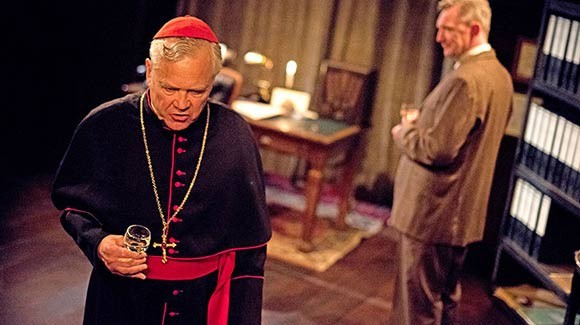OKLAHOMA!
Chichester Festival Theatre
In my rather music free home as a child we only had two Long Playing
records - one a collection of ballet numbers called “Nights at the Ballet” and
the other the film soundtrack of “Oklahoma!”. So if you see me at “Swan Lake”
watch out for me humming along to the Pas de Deux. And at “Oklahoma!” at the
“Chichester Festival Theatre” on Friday it was inevitable that at some point
I’d sing along. I managed to restrain myself until the final reprise of the
title song, then off I went.
Virtually every number in Rodgers and Hammerstein’s groundbreaking musical
is a standard from the “Great American Songbook”. (Interestingly the only two
that are not - “It’s a Scandal! It’s an Outrage” and “Lonely Room” were omitted
from the movie.) But familiar and wonderful though the songs are the things that
made “Oklahoma!” unique back in 1943 when it first appeared were the book and
the staging. And it also established R&H as the writer of quite hard-edged
musical dramas - musically lyrical for sure but also with real and quite
challenging story lines.
“Oklahoma!” is engaging but never comforting. The land on which the
settlers had started to farm in the mid 1850s was Indian Territory. The scandal
of the confiscation of lands from the Native Americans is well-described in the
Chichester programme by an academic from Florida State University. The
marginalisation of “First Nation” Americans is not referred to in Oscar
Hammerstein’s fine book, but it is the elephant in the room to some
extent.
But the settlers in what was “Oklahoma Territory” were quintessentially
symbols of the Great American Dream. All of European origin they were part of
the extraordinary story of the expansion of the country from its East Coast
colonial origins to the West. In the late 1890s that West was still “Wild” and
the gun and often rough justice ruled. But human emotions were present as well
and they were as raw as the environment and the social mores. When Curly appears
singing the gorgeous “Oh What a Beautiful Morning” at curtain-up he is
establishing an optimistic tenor which will mostly drive the action. It’s upbeat
and positive and youthful - appropriate for all those involved in the adventure
of creating a “Brand New State”.
But this is Rodgers and Hammerstein and to balance the light, upbeat,
sun-shining optimism of Curly and his love interest Laurey there has to be a
dose of hard reality - provided by the hired hand Jud Fry. Jud is gloomy whilst
they are gay, resentful and disgruntled where they are happy and cheerful. The
optimistic and youthful charm of Curly and Laurey is the norm - Ado Annie and
Will Parker are equally full of life and determined to live it to the full
whilst Jud Fry broods in his smokehouse.
The “outsider” is a ever present theme in R&H and here we have the
Persian peddler Ali Hakkim. This is a wonderful character creation and the way
this gentle intruder is seen by the others is utterly delightful. He is played by
Scott Karim with total conviction, great comic timing and roguish charm. There is a subtle symbolism here - America is an immigrant nation and Hakkim is not just a classic example of this but a reminder that diversity adds value.
In many ways storytelling musical theatre started with "Oklahoma!" (though "Showboat" also has a good claim). We are a long way from Busby Berkeley. There is dance though - a sophisticated and authentically choreographed ballet, another R&H innovation. To pull off Rodgers and Hammerstein you need a strong cast, first class musicianship, tight direction and design. This Chichester production has all this.
*****






